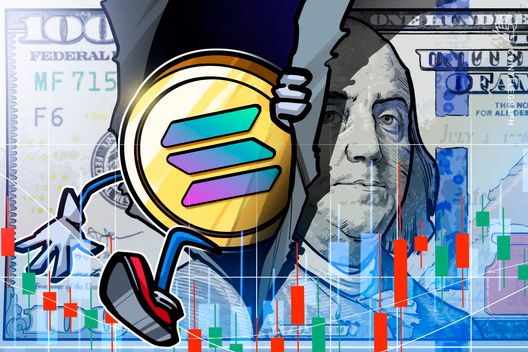The world of cryptocurrency is set to witness an intriguing new development as mtnCapital gears up to launch its official token, $MTN, at the end of March. This announcement comes from co-founders Barrett and Edgar Pavlovsky, who have been at the forefront of Solana’s developer community. What makes $MTN particularly noteworthy is not just its arrival but its role as the centerpiece of an experimental on-chain investment fund powered by an innovative governance model known as futarchy.
“I really think it’s going to outperform VC funds,” Barrett stated, highlighting the fund’s ambitious target to challenge traditional investment paradigms.
Futarchy, a system that has garnered attention among Solana’s enthusiasts, shifts decision-making from conventional voting to market predictions. In this model, the performance of the MTN token will dictate funding proposals—if traders believe a certain investment is promising, the token’s value will rise, thus allowing the proposal to pass. On the flip side, if they perceive a poor investment, the token’s value will decrease, leading to rejection. This governance style raises questions about the effectiveness of political voting in decentralized organizations, with Barrett arguing that it addresses issues like voter apathy and insider manipulation that often plague traditional systems.
“The one thing crypto’s found product-market fit with is trading, and with futarchy you’ve turned governance into an exchange,” Barrett elaborated, advancing the case for this novel approach.
MtnCapital plans to raise its operating funds by selling $MTN tokens directly to the public, putting all the power in the hands of market participants rather than relying on conventional venture capital structures. By relinquishing any privileged influence over the fund, the founders stress their intent to create a truly decentralized entity where outcomes depend on traders rather than a select few. This venture is set to run alongside mtnDAO, sharing branding and resources while maintaining distinct investment objectives.
The support for such a strategy has already been echoed by established investors, hinting at a growing interest in the futarchy model. Names like Colosseum, Paradigm, and Pantera have reportedly engaged with projects under MetaDAO, emphasizing an appetite for this kind of governance innovation.
This ambitious experiment marks another chapter in the evolving landscape of cryptocurrency governance, where the lines between trading and decision-making continue to blur, making it an exciting space to watch in the coming months.

Coworking Summits and the Launch of mtnCapital’s Token ($MTN)
The upcoming launch of the $MTN token at the mtnCapital aims to reshape decision-making in investment through an innovative governance model called futarchy. Here are the key points to consider:
- Launch of $MTN Token:
- Scheduled for the end of March during a monthlong Solana developer meetup.
- Functioning as the primary asset of mtnCapital, an on-chain investment fund.
- Futarchy Governance Model:
- Depicts a shift from traditional voting systems to market-based decision-making.
- Proposals are evaluated based on the performance of the MTN token in the market.
- Traders’ sentiments will directly impact investment decisions, making the process more dynamic and responsive.
- Decentralized Control:
- Founders will not hold controlling tokens, promoting equal investment opportunities.
- Investors are encouraged to purchase tokens rather than relying on airdrops or allocations.
- Investment Disruption:
- Challenges conventional venture capital models, potentially delivering better returns.
- Reflects a growing trend in crypto towards decentralized, market-driven governance.
- Transparency and Openness:
- All decisions within mtnCapital will be publicly accessible, promoting community engagement.
- Encourages speculative trading around the MTN token to influence investment outcomes.
“You need to have a mechanism that excites people if you are going to have results.” – Barrett
The introduction of mtnCapital and its $MTN token could significantly impact investors and cryptocurrency enthusiasts by offering a new way to engage with decentralized finance. By placing market predictions above traditional voting, it challenges existing paradigms and may appeal to those looking for innovative investment opportunities.
Revolutionizing Investment: An In-Depth Look at mtnCapital’s Futarchy Approach
The emergence of mtnCapital marks a significant evolution in how investment funds can operate within the ever-evolving landscape of decentralized finance (DeFi). Unlike traditional venture capital funds or even more conventional DAOs, mtnCapital brings forth a unique governance model rooted in the principles of futarchy. In contrast to other DeFi projects currently vying for attention, such as those hinged upon token-weighted voting, mtnCapital aims to empower market dynamics—a philosophy that presents both promising advantages and potential pitfalls.
Competitive Advantages: One of mtnCapital’s standout features is its reliance on the wisdom of the market to dictate fund decisions. This unique mechanism contrasts sharply with the common pitfalls found in traditional governance models, where uninformed voter behavior can skew outcomes. By placing decision-making in the hands of active traders, mtnCapital theoretically harnesses a more knowledgeable participant base. This could lead to more financially sound outcomes as traders leverage their insights and market sentiment. The founders, Barrett and Edgar, exude confidence, asserting that their model could outperform existing VC structures by autonomously adapting to market realities rather than entrenching into political or emotional biases.
Competitive Disadvantages: However, the very premise of futarchy may alienate a segment of the crypto community that believes in democratic governance and equal representation. Critics may argue that this approach fosters an environment where only wealthier individuals wield influence, skewing decision-making in favor of those with “big bags.” Additionally, the lack of traditional governance mechanisms might be viewed as a risky gamble, especially in a space often marred by volatility and speculation. The risk of market manipulation also looms large; should a few traders conspicuously exercise their influence, they could steer the fund’s decisions in self-serving directions.
The implications of mtnCapital’s model extend well beyond its immediate participants. Who stands to benefit? Market-savvy investors looking for innovative investment strategies may find opportunities in mtnCapital’s structure, particularly those who thrive in a trades-centric environment. Institutions or individuals who excel in predictive trading might revel in an investment option that allows them to leverage their expertise directly within fund governance.
On the flip side, would-be investors who align with traditional DAO principles may find mtnCapital’s approach unsettling. The progressive transition from a democratic voting style to market-driven governance might deter those who value collective decision-making over speculative advantage. Hence, users who champion equal representation in investment decisions could feel sidelined by this model that rewards monetary clout over diverse opinions.
Overall, mtnCapital presents a fresh lens through which to view investment in the digital age. Its commitment to a futarchy-centered approach may herald a new chapter in decentralized finance, potentially freeing investment decisions from the pitfalls of conventional governance. Yet, the challenge remains: as traders engage with this new system, the need for a fair and sustainable model that balances influence and wisdom will be crucial for widespread acceptance and success.













